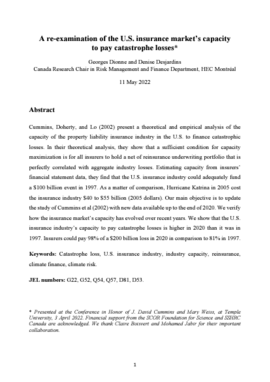"Effects of Climate Risks on Non-Life Insurers' Resilience"
SCOR Foundation Funded Project Report

This is the first report of the project "Effects of Climate Risks on Non-Life Insurers' Resilience", financed by the SCOR Foundation.
Georges Dionne and Denise Desjardins
Canada Research Chair in Risk Management and Finance Department, HEC Montréal - May 2022
Cummins, Doherty, and Lo (2002) present a theoretical and empirical analysis of the capacity of the property liability insurance industry in the U.S. to finance catastrophic losses. Estimating capacity from insurers’ financial statement data, they find that the U.S. insurance industry could adequately fund a $100 billion event in 1997. As a matter of comparison, Hurricane Katrina in 2005 cost the insurance industry $40 to $55 billion (2005 dollars). The main objective of this research is to update their study with new data available up to the end of 2020. It shows that the U.S. insurance industry’s capacity to pay catastrophe losses is higher in 2020 than it was in 1997. For example, insurers could pay 98% of a $200 billion loss in 2020 in comparison to 81% in 1997.”
More about the Funded Project (2020-2023)
